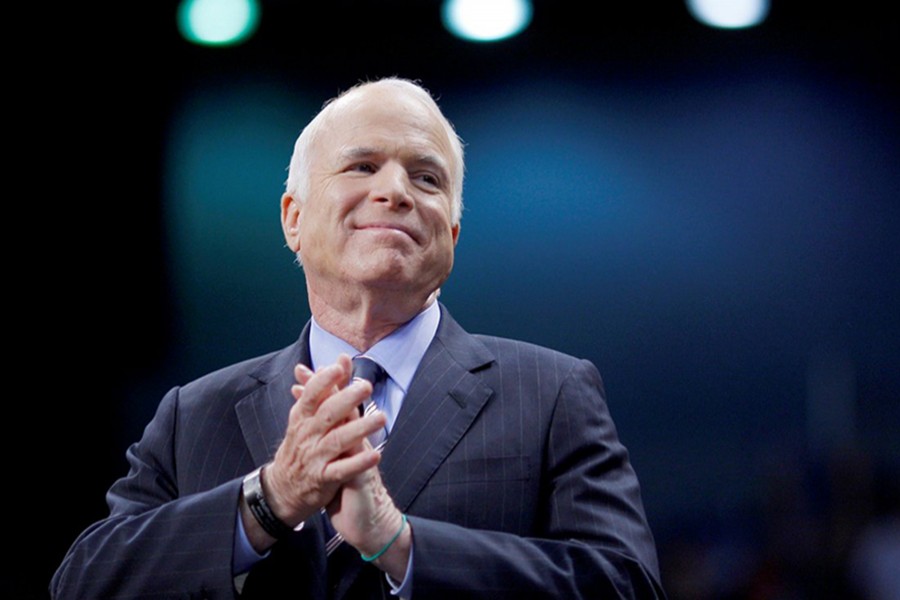US Senator John McCain, a former prisoner of war in Vietnam who ran unsuccessfully for president as a self-styled maverick Republican in 2008 and became a prominent critic of President Donald Trump, died on Saturday, his office said. He was 81.
McCain, a US senator from Arizona for over three decades, had been battling glioblastoma, an aggressive brain cancer, discovered by his doctors in July 2017, and had not been at the US Capitol in 2018. He also had surgery for an intestinal infection in April of this year.
His family had announced on Friday that McCain was discontinuing further cancer treatment.
A statement from his office on Saturday said: “Senator John Sidney McCain III died at 4:28 p.m. on August 25, 2018. With the senator when he passed were his wife Cindy and their family. At his death, he had served the United States of America faithfully for sixty years.”
No further details were immediately provided, according to a Reuters report.
“My heart is broken. I am so lucky to have lived the adventure of loving this incredible man for 38 years,” Cindy McCain wrote on Twitter. “He passed the way he lived, on his own terms, surrounded by the people he loved, in the place he loved best.”
The vacancy created by McCain’s death narrowed the Republican majority in the US Senate to 50 seats in the 100-member upper chamber, with Democrats controlling 49 seats. But Republican Arizona Governor Doug Ducey is expected to appoint a member of his own party to succeed McCain.
That could also give Republicans a slight edge in the battle to confirm Brett Kavanaugh to the US Supreme Court in the weeks ahead, as McCain had been too ill to cast any votes this year.
Alternatively affable and cantankerous, McCain had been in the public eye since the 1960s, when as a naval aviator he was shot down during the Vietnam War and tortured by his North Vietnamese communist captors during 5-1/2 years as a prisoner.
He was edged out by George W. Bush for the Republican presidential nomination in 2000, but became his party’s White House candidate eight years later. After gambling on political neophyte Sarah Palin as his vice presidential running mate, McCain lost in 2008 to Democrat Barack Obama, who became the first black US president.
Paying tribute to his onetime election opponent, Obama said in a statement that he and McCain, despite their “completely different backgrounds,” and political differences, shared “a fidelity to something higher - the ideals for which generations of Americans and immigrants alike have fought, marched and sacrificed.”
“We saw our political battles, even, as a privilege, something noble, an opportunity to serve as stewards of those high ideals at home, and to advance them around the world,” Obama wrote.
Defense Secretary James Mattis saluted McCain as a figure who “always put service to the nation before self,” and “represented what he believed, that ‘a shared purpose does not claim our identity - on the contrary - it enlarges your sense of self.’”
McCain, chairman of the Senate Armed Services Committee, remained prominent during and after the last White House race as both a frequent critic and target of his fellow Republican, Trump, who was elected president in November 2016.
McCain denounced Trump for among other things his praise of Russian President Vladimir Putin and other leaders the senator described as foreign “tyrants.”
“Flattery secures his friendship, criticism his enmity,” McCain said of Trump in his memoir, “The Restless Wave,” which was released in May.
McCain in July had castigated Trump for his summit with Putin, issuing a statement that called their joint news conference in Helsinki “one of the most disgraceful performances by an American president in memory.” He said Trump was “not only unable but unwilling to stand up to Putin.”
Sources close to McCain have said Trump would not be invited to the funeral.
Shortly after McCain’s death was announced, Trump tweeted: My deepest sympathies and respect go out to the family of Senator John McCain.”
McCain, a foreign policy hawk with a traditional Republican view of world affairs, was admired in both parties for championing civility and compromise during an era of acrid partisanship in US politics. But he also had a famous temper and rarely shied away from a fight. He had several with Trump.


